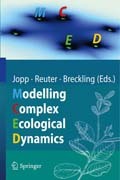
Modelling complex ecological dynamics: an introduction into ecological modelling for students, teachers and scientists
Breckling, Broder
Kraft, Dietmar
Kubicek, Andreas
Gallego, Winfried Kurth
Model development is of vital importance for understanding and management of ecological processes. Identifying the complex relationships between ecologicalpatterns and processes is a crucial task. Ecological modelling—both qualitatively and quantitatively—plays a vital role in analysing ecological phenomena and for ecological theory. This textbook provides a unique overview of modelling approaches. Representing the state-of-the-art in modern ecology, it shows how to construct and work with various different model types. It introduces the background of each approach and its application in ecology. Differential equations, matrix approaches, individual-based models and many other relevant modelling techniques are explained and demonstrated with their use. The authors provide links to software tools and course materials. With chapters written by leading specialists, “Modelling Complex Ecological Dynamics” is an essential contribution to expand the qualification of students, teachers and scientists alike. Offers a comprehensive overview of methods, approaches and applications ofmodelling in ecology Includes cases from different parts of the world Leadingspecialists explore different biomes and explore their interaction of different types of organisms INDICE: Introduction ; Theoretical backgrounds: Scope and general definitions used in ecological modelling; What are the general conditions, under whichmodels can be applied?; History of ecological modelling, and modern developments.- Modelling Techniques and Approaches ; Context assessment and Systems analysis; Steady State Models of Ecological Systems; Ordinary Differential Equations; Partial Differential Equations Cellular Automata; Leslie-Matrices; Fuzzy Sets; L-Systems, and Fractals; Agent- and Individual-based Models; Modelling landscape dynamics and Habitat Suitability; Decision trees and data mining.- Application fields, case studies and examples ; Conceptual and theoretical models (Analysing Landscape Structure using Neutral Models); Case Studies: Application of ecological models in management (Coral-Algae-Interaction; Stage-structured invasion models; Trophic Cascades and Food Web Stability in Fish Communities of the Everglades); Case Studies: Model Coupling and Multi-scale issues (Bio-Physical Models: An Evolving Tool in Marine Ecological Research; Potentials of GIS – Model Coupling; Modelling the Everglades Ecosystem).- Strategies of model development ; Model validation, Parameter estimation, Sensitivity Analysis."
- ISBN: 978-3-642-05028-2
- Editorial: Springer
- Encuadernacion: Rústica
- Páginas: 397
- Fecha Publicación: 01/01/2011
- Nº Volúmenes: 1
- Idioma: Inglés
